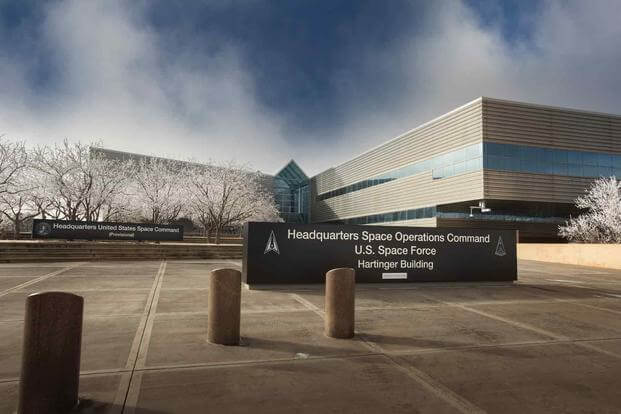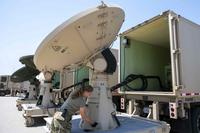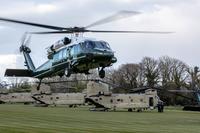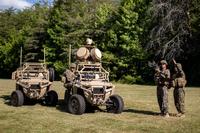Air Force Secretary Frank Kendall said for months that additional analysis was needed to decide whether U.S. Space Command should move to Alabama or remain in Colorado -- and that the decision was his to make.
But on Monday, President Joe Biden told the Pentagon that he had made the decision, a move which military experts said is unusual and clearly breaks with public comments that the choice would remain with the Air Force.
The president's decision also appeared to end a years-long political tug-of-war between lawmakers from the two states vying for the command, its prestige and all the federal dollars it could attract. Biden's announcement angered the Alabama delegation, including Rep. Mike Rogers, the Republican chairman of the House Armed Services Committee who had choked off Air Force funding to force a decision for his state.
Read Next: Public's Confidence in the Military Drops Again
"Today's decision by President Biden to locate the permanent headquarters of U.S. Space Command in Colorado Springs will avoid any disruption to its operational capability," Kendall said in a statement. "The Department of the Air Force will now work expeditiously to implement the decision."
Kendall, who was nominated by Biden in April 2021 and confirmed by the Senate a few months later, added in his statement that "I fully support the president's decision." A Department of Air Force spokeswoman didn't comment on whether Biden's announcement came as a surprise or if he was asked to provide input on the decision.
Pentagon Press Secretary Brig. Gen. Pat Ryder said in a statement that Biden notified the Pentagon that he had selected Peterson Space Force Base in Colorado Springs for Space Command "after consultation with [Defense Secretary Lloyd] Austin and weighing the input of senior military leaders."
The White House did not immediately return a request for comment asking whether Kendall was consulted prior to the announcement and why Biden chose to make the final decision instead of the Air Force secretary.
Gen. James Dickinson, the head of U.S. Space Command, also told reporters in November that the decision was Kendall's to make.
"That is a decision by the secretary of the Air Force, and I know that they have been doing a very deliberate analysis of the two reports that came out," Dickinson told Military.com.
More recently, at the Air and Space Force Association's conference in Colorado in March, Kendall himself told Military.com that he was requesting additional information and conducting more reviews before he made a final choice.
"I hoped to make a decision and make an announcement earlier," Kendall said during a roundtable at the Air Warfare Symposium. "We're doing some additional analysis; we want to make very sure we got this right and have a well-defended decision."
At the time, Kendall said that one issue would be potentially putting two combatant commands in Colorado, which is already home to U.S. Northern Command. He added that his office was doing "sensitivity analysis," a type of financial modeling that looks at what-if scenarios to measure risks.
It's not clear whether that analysis was completed prior to Biden's decision.
Katherine Kuzminski, a senior fellow at the Center for a New American Security think tank who researches military culture and family issues, told Military.com that the president does have the right to make basing decisions but noted it is unusual.
"As the commander in chief, he is kind of the ultimate guidance for any confirmed appointees," Kuzminski said. "But usually we don't see presidents having much of an opinion on exactly where our military basing decisions are made."
The fight over the final basing decision quickly became seen as a fight between Republicans and Democrats, Red State and Blue State politics and, ultimately, former President Donald Trump and current President Biden.
U.S. Space Command -- SPACECOM -- was reactivated in August 2019 and temporarily stationed at Peterson. SPACECOM is responsible for military operations related to space, while the Space Force organizes and trains space personnel.
In August 2021, while speaking on an Alabama radio show, Trump said the move to the Army's Redstone Arsenal in Huntsville was his decision, which sparked speculation that the former president may have intervened in the process for choosing the base, something that could give ammunition to legal challenges.
Two watchdog reports, requested by members of Colorado's delegation in Washington, followed. They did not point to any major issues with Huntsville as a location for the base, but did scrutinize the process for choosing it.
In May, the findings of a Department of Defense inspector general report said that, while the selection process was marred by shoddy recordkeeping, the ultimate decision to choose Huntsville was reasonable.
And in June, the Government Accountability Office released a report saying that Space Command's move from Colorado to Alabama was driven by an unorganized and unclear process. While that report did not comment on or analyze whether the choice of Huntsville as the home of Space Command was acceptable, the congressional watchdog organization did express concerns about "significant shortfalls in its transparency and credibility," as well as the "appearance of bias" in the decision.
The GAO report did not address whether Trump, or any senior military official, was responsible for the ultimate selection of Redstone Arsenal.
Meanwhile, the Supreme Court decision last year allowing states to ban abortion also hangs over the decision.
Moving Space Command from Colorado, where abortion access is unrestricted, to Alabama, where it is illegal with limited exceptions, was also seen as a negative for service members assigned to the command. It has raised a red flag for some Colorado lawmakers who believe it will hurt troops' quality of life, as well as harm the military's retention efforts.
In June, the Air Force denied the concerns. It told Military.com that "reproductive health care and state laws regarding the LGBTQ+ community are not currently part of the criteria considered in the Department of the Air Force strategic basing process."
But Rogers decried the Biden administration's choice in a statement Monday, claiming "that far-left politics, not national security, was the driving force behind this decision."
The chairman told Military.com last month he was holding up the military's ability to move around budgeted funds and cover funding shortfalls because the Air Force hadn't announced whether U.S. Space Command would be permanently located in his state.
A week later, he backtracked and allowed the Air Force to reinstate bonuses for service members that were held up.
Rogers said he was investigating the circumstances around the basing reversal.
"I will continue to hold the Biden administration accountable for their egregious political meddling in our national security," Rogers said. "This fight is far from over."
Sen. Tommy Tuberville, R-Ala., who is currently holding up hundreds of military promotions -- which are typically approved in bulk by the Senate -- over the Pentagon's travel policies relating to abortion, similarly accused Biden of politicizing the decision.
"Once again, Joe Biden is injecting politics into the military," Tuberville said in a statement. "This sets a dangerous precedent that military bases are to be used as rewards for political support rather than for national security."
Sens. Michael Bennet and John Hickenlooper, both Colorado Democrats, praised the reversal.
"Over the past two and half years, we have repeatedly made the case that the Trump administration's decision to relocate U.S. Space Command was misguided," Bennet said in a statement. "Colorado is the rightful home for U.S. Space Command, and our state will continue to lead America in space for years to come."
Ryder said in a statement announcing Biden's selection of Colorado Springs that the decision was connected to readiness.
"Locating Headquarters U.S. Space Command in Colorado Springs ultimately ensures peak readiness in the space domain for our nation during a critical period," Ryder said. "It will also enable the command to most effectively plan, execute and integrate military spacepower into multi-domain global operations in order to deter aggression and defend national interests."
The saga of the basing and what appears to be a final decision by the president has created a concerning scenario, according to Kuzminski.
"Both the White House and Congress don't come out looking great if what they're doing is teeing up the military as a bargaining chip over political and partisan issues," Kuzminski said.
-- Thomas Novelly can be reached at thomas.novelly@military.com. Follow him on Twitter @TomNovelly.
Related: Alabama Chairman Releases Hold on Air Force Personnel Funds, But Space Command Standoff Continues












